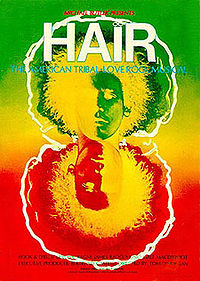Hair: Difference between revisions
AllegraSimon (talk | contribs) m (moved Musical "Hair" Faces Censorship Around the World to Hair) |
AllegraSimon (talk | contribs) No edit summary |
||
| Line 1: | Line 1: | ||
====Date: [[:Category: | ====Date: [[:Category:1968|1968]]==== | ||
====Region: [[:Category:North America|North America]] [[:Category:Europe|Europe | ====Region: [[:Category:North America|North America]], [[:Category:Europe|Europe]]==== | ||
====Subject: [[:Category:Explicit Sexuality|Explicit Sexuality]] [[:Category:Nudity|Nudity | ====Subject: [[:Category:Explicit Sexuality|Explicit Sexuality]], [[:Category:Nudity|Nudity]]==== | ||
====Medium: [[:Category:Theatre|Theatre | ====Medium: [[:Category:Theatre|Theatre]] ==== | ||
---- | ---- | ||
[[File:Hair.jpeg|right|200px]] | |||
'''Artist:''' Written by Gerome Ragni and James Rado, music by Galt MacDermot | '''Artist:''' Written by Gerome Ragni and James Rado, music by Galt MacDermot | ||
| Line 31: | Line 32: | ||
'''Description of Artwork:''' | '''Description of Artwork:''' ''Hair'' was a rock-musical about hippies. The characters in the play attack the draft, the Vietnam war, and the mainstream. They celebrate drugs and sex. The climax of the musical comes in Act I when the members of the cast-or the "tribe"- appear on-stage naked. <P> | ||
'''The Incident:''' The musical opened in New York in 1968 and went on to play around the world. In Europe, Australia, and Japan the musical was also a big success despite threats of official sanction. In South Africa | '''The Incident:''' The musical opened in New York in 1968 and went on to play around the world. In Europe, Australia, and Japan the musical was also a big success despite threats of official sanction. In South Africa even the cast album was banned. In New Zealand the cast was arrested, tried, and acquitted. Some of the performances, both in the United States and abroad, were met with protests by the audience. In Boston the management of ''Hair'' went to court for the first time in 1970 to stay a district attorney's threat to arrest the cast. The federal government finally decided the play was not obscene. When touring the south and southwestern United States 10 communities refused to allow their auditoriums to host the show. The cast and management went to federal court in the states of Alabama, Arkansas, Florida, North Carolina, Oklahoma, Tennessee, and Texas. In five of these states the courts ruled with the "Hair" management. In Oklahoma, Florida, and Alabama the management won only after an appeal. In 1972 in Chattanooga, Tennessee ''Hair'' had been denied a license three times. In this case the judge turned the case into a case on obscenity and separated the speech of the play from the non-speech of the play. He classified the nude scene as "non-speech", or conduct, which was not protected under the First Amendment. In 1972 this court ruled against ''Hair''. In 1973 the Sixth Circuit Court of Appeals agreed with this decision. The ''Hair'' management again appealed and in 1975 the Supreme Court ruled in a 5-4 decision that ''Hair'' could not be divided into "speech" and "non-speech". <P> | ||
| Line 47: | Line 48: | ||
[[Category: | [[Category:1968]] | ||
[[Category: | [[Category:1960s]] | ||
[[Category:]] | [[Category:20th century]] | ||
[[Category:North America]] | [[Category:North America]] | ||
| Line 57: | Line 58: | ||
[[Category:Europe]] | [[Category:Europe]] | ||
[[Category:]] | [[Category:United States]] | ||
[[Category:Explicit Sexuality]] | [[Category:Explicit Sexuality]] | ||
[[Category:Nudity]] | [[Category:Nudity]] | ||
[[Category:Theatre]] | [[Category:Theatre]] | ||
[[Category:Written by Gerome Ragni and James Rado, music by Galt MacDermot]] | [[Category:Written by Gerome Ragni and James Rado, music by Galt MacDermot]] | ||
__NOTOC__ | __NOTOC__ | ||
{{DISPLAYTITLE:<span style="font-style: italic;">Hair</span>}} | |||
Revision as of 20:39, 25 July 2011
Date: 1968
Region: North America, Europe
Subject: Explicit Sexuality, Nudity
Medium: Theatre
Artist: Written by Gerome Ragni and James Rado, music by Galt MacDermot
Confronting Bodies: The United States government and authorities
Dates of Action: 1968-1975
Location: The United States
Description of Artwork: Hair was a rock-musical about hippies. The characters in the play attack the draft, the Vietnam war, and the mainstream. They celebrate drugs and sex. The climax of the musical comes in Act I when the members of the cast-or the "tribe"- appear on-stage naked.
The Incident: The musical opened in New York in 1968 and went on to play around the world. In Europe, Australia, and Japan the musical was also a big success despite threats of official sanction. In South Africa even the cast album was banned. In New Zealand the cast was arrested, tried, and acquitted. Some of the performances, both in the United States and abroad, were met with protests by the audience. In Boston the management of Hair went to court for the first time in 1970 to stay a district attorney's threat to arrest the cast. The federal government finally decided the play was not obscene. When touring the south and southwestern United States 10 communities refused to allow their auditoriums to host the show. The cast and management went to federal court in the states of Alabama, Arkansas, Florida, North Carolina, Oklahoma, Tennessee, and Texas. In five of these states the courts ruled with the "Hair" management. In Oklahoma, Florida, and Alabama the management won only after an appeal. In 1972 in Chattanooga, Tennessee Hair had been denied a license three times. In this case the judge turned the case into a case on obscenity and separated the speech of the play from the non-speech of the play. He classified the nude scene as "non-speech", or conduct, which was not protected under the First Amendment. In 1972 this court ruled against Hair. In 1973 the Sixth Circuit Court of Appeals agreed with this decision. The Hair management again appealed and in 1975 the Supreme Court ruled in a 5-4 decision that Hair could not be divided into "speech" and "non-speech".
Results of Incident: "Hair" did not play in Chattanooga until 15 years later.
Source: Censorship: A World Encyclopedia
